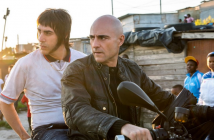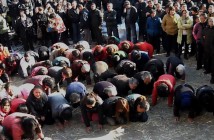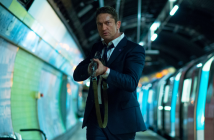
Editor’s Notes: Macbeth, The Forbidden Room, Paris Belongs to Us, & The Mask You Live In will be released on their respective formats on March 8th.
Macbeth

Macbeth (Anchor Bay) stars Michael Fassbender (Steve Jobs, 12 Years a Slave) as Shakespeare’s tragic hero — the thane of Cawdor and would-be king. Loyal to King Duncan (David Thewlis), whose enemies are in striking distance of dethroning him, Macbeth has one final chance to turn the tide in favor of his liege. The decisive battle occurs both in real time and in slow motion and it is bloody, brutal, and intense. Macbeth distinguishes himself as a relentless warrior.
After he dispatches the last of his foes, a trio of witches prophesies that Macbeth will be king. Unanswered are the how and why.
Australian director Justin Kurzel opens with Macbeth and Lady Macbeth (Marion Cotillard) looking on sadly as their young child is laid to rest. This scene puts a different slant on Macbeth. He is no longer merely power hungry or easily swayed by his ambitious wife. Now, he is a man crippled by mourning and likely suffering from battle stress. This is not in the original, but provides Macbeth with another reason for the course of action he will pursue.
Both Fassbender and Cotillard are excellent leads. The production itself is troublesome. Sometimes director Kurzel creates elaborate, visually strong sequences such as the opening battle scene. Other times, however, the scenes seen too muted and underplayed. The witches, for example, appear fairly tame, almost as if they were following a manual of polite behavior. This decision deprives what should be a great moment in the film of the proper dramatic emphasis. Lady Macbeth is portrayed more sympathetically than is customary, which humanizes her but dilutes her thirst for power.
Movie adaptations of Macbeth have been made by Orson Welles, Akira Kurosawa, Roman Polanski, and Trevor Nunn, among others. Kurzel’s version is about average. It’s frustrating that the actors deliver their lines under their breath or even in whispers. With Shakespearian language, we shouldn’t have to acclimate our ear to the Bard’s cadences and struggle to hear what’s being said.
Bonus extras on the Blu-ray release include a making-of featuette and a Q & A with Michael Fassbender.
The Forbidden Room

The Forbidden Room (Kino Lorber), directed by Canadian Guy Maddin, is characterized by references to silent cinema, odd use of color, multiple layers of plot, and surrealistic images. Extremely dense and hard to fathom, its nearly two-hours is a tough cinematic experience, particularly for those unfamiliar with Maddin’s earlier films and offbeat style.
The film opens with a prologue in which a dressing-gown-clad narrator (Louis Negin) provides instructions on how to take a bath, the bathwater representing the ocean. The film then switches to the crew of a doomed submarine eating pancakes in a desperate attempt to breathe the oxygen within them. Inexplicably, a lost woodsman wanders into their company and tells of escaping from a fierce clan of cave dwellers. From this point, Maddin and co-director Evan Johnson take us high into the air, around the world, and into a series of dreamscapes, offering tales of amnesia, captivity, deception, murder, skeleton women, and vampire bananas. Like an onion, the film is made up of multiple layers of imagery and story.
Though initially fascinating, the movie soon wears thin because it’s virtually impossible to follow any single thread of a story. As a much shorter, experimental film, The Forbidden Room might have been more sustainable, but as a feature, its extreme obscurity makes it seem like a vanity project for Maddin. The movie distances viewers rather than drawing them in.
Bonus extras on the Blu-ray release include audio commentary with Guy Maddin and Evan Johnson; “Once a Chicken,” a seance with Lazslo Moholy-Nagy; and a booklet with essays.
Paris Belongs to Us

Paris Belongs to Us (French title: Paris nous appartient, The Criterion Collection) is the first feature by Jacques Rivette (Celine and Julie Go Boating), a former critic for Cahiers du Cinema. Made on small budget, Paris Belongs to Us is an early example of the French New Wave, later popularized by Chabrol, Truffaut, and Godard. Though it never achieved the popularity of such films as The 400 Blows and Breathless, it portrays the radical flavor that would define the movement that captured young Parisian idealists of the mid-1950s.
Anne Goupil (Betty Schneider) is a young literature student living in a Paris student hostel, whose brother Pierre (Francois Maistre), draws her into the intrigues of his bohemian circle, the conspiracy theories of the blacklisted American writer Philip Kaufman (Daniel Crohem), and the artistic ambitions of theatre director Gerard Lenz (Giani Esposito), who is staging a low-budget production of Pericles.
Filmed in pieces between 1958 and 1960 because of money problems, the movie was finally released in 1961. Shooting in black and white, Rivette weaves an atmosphere of paranoia, preoccupation with conspiracy, and a sense of post-World War II disillusionment combined with an often playful fascination with theatrical performance. It’s notable for capturing, like a time capsule, a distinct era, and provides some great views of the streets and hustle-bustle of the Left Bank. At 141 minutes, the movie is overly long and could have benefited from tighter editing.
Bonus extras on the Blu-ray release include an interview with the author of a book on the French New Wave; Jacques Rivette’s short 1956 film Le coup de berger, featuring fellow New Wave directors Claude Chabrol, Jean-Luc Godard, and Francois Truffaut; and a critical essay. The movie is a new digital restoration, In French, with English subtitles.
The Mask You Live In

The Mask You Live In (Virgil Films) is a documentary that explores societal expectations of men by following boys and young men as they struggle to stay true to themselves while dealing with America’s narrow definition of masculinity. With constant pressure from the media, peer groups and even adults in their lives, the subjects in the film confront messages encouraging them to disconnect from their emotions, devalue authentic friendships, objectify women, and resolve conflicts through violence. These stereotyping influences interconnect with race, class, and circumstance, creating a confusing labyrinth of identity issues boys and young men must navigate to become “real’ men. Experts in neuroscience, psychology, sociology, sports, education, and media provide empirical evidence of this “boy crisis” and tactics to combat it.
The movie highlights the implications of language associated with maleness (“be a man” or “man up”), examines stereotypes of athletic and financial success, and supports the points it makes with TV and film clips and numerous statistics flashed on screen (although without attribution). Other factors — drinking, mass shootings, homophobia, depression, bullying, crime, video games, porn and campus sexual assault — are addressed, and several boys and grown men share anecdotes about their fathers and upbringing.
The discussions are frank and montage images are often graphic. There is strong language, particularly the slurs boys and men use to disparage one another’s masculinity.
While not soft-pedaling the darker moments, director Jennifer Siebel Newsom gives the documentary a hopeful outlook. If kids can be raised to reject outdated, limiting roles, society in general can help boys develop more enlightened, healthier identities as men.
There are no bonus features on the unrated widescreen DVD release.



